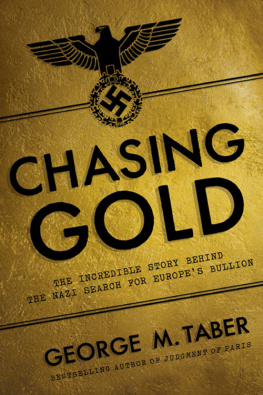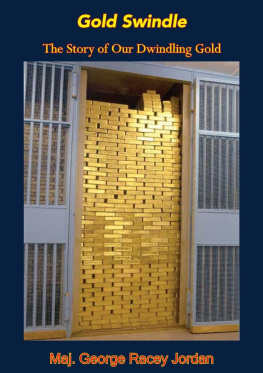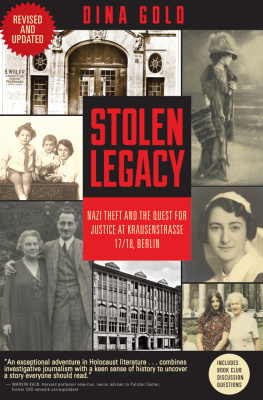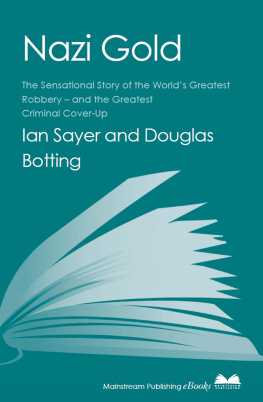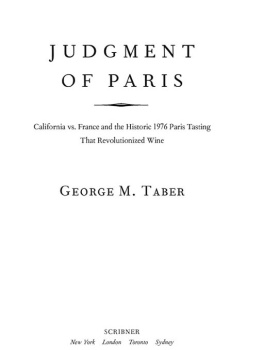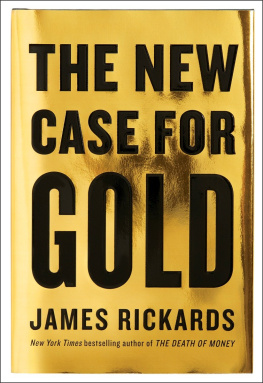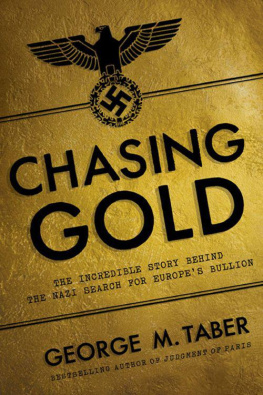Taber Douglass F. - Chasing Gold
Here you can read online Taber Douglass F. - Chasing Gold full text of the book (entire story) in english for free. Download pdf and epub, get meaning, cover and reviews about this ebook. City: New York, year: 2014, publisher: Pegasus, genre: Politics. Description of the work, (preface) as well as reviews are available. Best literature library LitArk.com created for fans of good reading and offers a wide selection of genres:
Romance novel
Science fiction
Adventure
Detective
Science
History
Home and family
Prose
Art
Politics
Computer
Non-fiction
Religion
Business
Children
Humor
Choose a favorite category and find really read worthwhile books. Enjoy immersion in the world of imagination, feel the emotions of the characters or learn something new for yourself, make an fascinating discovery.
- Book:Chasing Gold
- Author:
- Publisher:Pegasus
- Genre:
- Year:2014
- City:New York
- Rating:4 / 5
- Favourites:Add to favourites
- Your mark:
- 80
- 1
- 2
- 3
- 4
- 5
Chasing Gold: summary, description and annotation
We offer to read an annotation, description, summary or preface (depends on what the author of the book "Chasing Gold" wrote himself). If you haven't found the necessary information about the book — write in the comments, we will try to find it.
Chasing Gold — read online for free the complete book (whole text) full work
Below is the text of the book, divided by pages. System saving the place of the last page read, allows you to conveniently read the book "Chasing Gold" online for free, without having to search again every time where you left off. Put a bookmark, and you can go to the page where you finished reading at any time.
Font size:
Interval:
Bookmark:

I have been for years interested in the story of central bank gold in World War II, and this book has been a longtime work of love. It was also a massive undertaking because it involved so many countries and different foreign languages. One dispirited day I did a quick calculation and figured that I had to research more than two dozen countries with nearly that many languages. I can work in English, French, and German, but not in Norwegian, Albanian, Portuguese, Dutch, Russian, and many others.
The first thank-you goes to Curt Prendergast, my first boss at Time magazine, who as the dedication explains, tipped me off to the topic nearly fifty years ago.
Fortunately, I was able to put together a team of people from all around Europe who helped me in a variety of ways. Some tracked down documents; others helped me with translations. Others did translations of reports and even whole books. They all helped me understand their countrys wartime history. They also read the chapter about their nation and made helpful suggestions and corrections. The book could not have been done without them. The list starts with two Germans, Dirk Lau in Hamburg and Elisabeth Kaiser in Brussels. They were both patient with many questions and guided me around the shoals of German history. Elisabeth found some crucial books and offered wise counsel. Dirk and I had Skype phone calls to discuss things, and he also did research at the Berlin archives. Both sometimes double-checked my German translations.
They, though, were only the beginning. The list begins with winter neighbors in Vero Beach, such as Jurich Dorawa in Vero Beach, FL, who helped with Polish documents. Hermann Schnabl and Evelyn Kopke-Gripenberg did the same with German, and Boyd Fellows improved the quality of the photographs. Jacek Szafran helped with both Polish translations and his knowledge of his countrys history. Jan Emsbro found Norwegian material, and Keith Lewis guided me through maritime terms. Mary Ann Sorrentino translated a crucial Italian book. Tihmir Lerner helped from Croatia. Mari H. Rowland translated the long report written in 1940 by the leader of the Norwegian gold evacuation. Per Arnt Harnes, author of Gulltransporten, read the Norwegian chapter. Bo Lidegaard in Denmark translated a crucial section of his book Kampen om Danmark 1933-1945. Anders Bergnas, a graduate school friend, helped me in Sweden. When I was in Belgium, Hermann Van der Wee and Walter Pluym, who have both written books about their countrys gold saga, were very generous with their time and pointed me to key documents. Van der Wees book, which was done with his wife Monique Verbreyt, is A Small Nation. Pluyms work, written with his brother Jan, is Goud op Drift in the Dutch edition and Or la Drive in the French one.
Officials at the Banque de France were extremely helpful both before and after the week I did research in Paris. Didier Bruneel, the director of the excellent publication Cahiers anecdotiques de la Banque de France and the special counselor to the banks president, helped in many ways. He provided the first solid information about how the Soviet Union saved its gold, and also allowed me to use photographs he had collected for his own book Les Secrets de lOr. When I arrived in Paris, Arnaud Manas, the head of the archives at the French National Bank, had just finished the defense of his doctoral thesis on the Vichy governments gold policy. He gave me a copy of it and also helped me find my way through his archives.
Paul Dostert in Luxembourg has done work on his own countrys gold during the war, and he gave him time both to explain what happened and point me to the archives. We also had a pleasant lunch at an outdoor caf.
A small team helped in Holland. Alexander Nieuwenhuis put together an excellent program that got me to the right people. Ronald Dijkstra, who was just finishing his own book on the Dutch story, spent a day walking around Rotterdam, retracing the steps of the soldiers who carried gold to a boat that hit a mine and sank and then visiting the site. We also visited the ship museum near the Hook of Holland, where officials told us more about the ship. Gerard Aalders, who has written an excellent book in Dutch about his countrys gold, answered all my questions over glasses of Dutch beer. Daphne Dupont-Nivet translated his book for me.
Svetlana Chervonnaya in Moscow deserves all the credit for finding the right Russian documents and then translating them. It would have been impossible to do the Soviet chapter without her. She was also very helpful in unraveling the story of the shipment of Spanish gold to Moscow in 1936.
In Britain, Robert Hart, who was a fellow journalist many years ago in Bonn, worked with me for a week combing the British National Archives outside London for cabinet records and ship logs.
Central bankers have a reputation for being stuffy, but officials at banks from Portugal to Turkey, with many more in between, were generous in providing help in uncovering their stories. Most of the communication was done over the Internet. I would like to thank in particular Jenni Hellstrm at the Bank of Finland, who sent me the chapter from a history of her bank that dealt in detail with the Finnish story.
Officials in national and central bank archives are the unsung people in the background. They helped find the right documents or photographs. Joseph M. Komljenovich, Julie Sanger, and Marja Vitti at the New York Federal Reserve opened up their collections during two long visits. Officials at the Franklin D. Roosevelt Library and the Harry S. Truman Library were helpful when I visited their archives. The William J. Clinton Library provided documents over the Internet. The staffs of the U.S. National Archives in College Park Maryland, the Banque de France, the Bundesarchiv in Berlin and Freiburg, the Bayerische Hauptstaatsarchiv in Munich, and at the British National Archives were particularly valuable. I made four long visits to the U.S. National Archives in College Park, MD, and Margaret Shannon and Candace Clifford also did work for me there. Peter Voskamp tracked down some crucial material at the newspaper collection of the Library of Congress in Washington. The staff at the Thomas J. Dodd Research Center at the University of Connecticut opened its wonderful collection of Nuremberg Trial documents. Andy Hollinger of the United States Holocaust Memorial Museum in Washington provided many useful photos from its collection.
Librarians also were essential aides. I thank those at Brown University, University of Rhode Island, Stanford University, the New York Public Library, Princeton University, University of Connecticut, Harvard Business School, Vero Beach, and the Block Island Free Library.
The most important assistance of all came from my wife Jean, who over several years read and edited many early versions of chapters, and from our daughter Lara, who diagnosed computer problems and also created the maps that accompany most chapters and designed the books photo pages. Both Jean and Lara were always there for me.
Special thanks to Jennifer McCartney for very carefully proofreading the manuscript.
I would also like to give special thanks to Harvey Klinger, my agent now for five books, and to Jessica Case and all the people at Pegasus Books.
G ermany was historically a major holder of central bank gold, but just prior to the war the country had only a small amount because of its ongoing economic problems. Following orders from Reichsbank President Hjalmar Schacht, the holdings as early as 1933 were divided between published accounts and hidden ones, so that the world would not know how much the country actually had. Nazi leaders needed gold to buy critical war material on the international market. Before the world conflict began, Germany captured a large amount of bullion in Austria and a smaller cache in Czechoslovakia. Most of that, though, was soon spent on armaments, and the bullion holdings were again low when World War II began with the invasion of Poland. The Nazis captured much more after their invasion of Western Europe in 1940. Almost all of the gold seized during the war had been confiscated by the end of 1940. Although the worlds public was outraged by the theft of bullion as well as other valuables from private individuals, in particular concentration camp inmates, that was a relatively small amount when compared with what was stolen from central banks
Next pageFont size:
Interval:
Bookmark:
Similar books «Chasing Gold»
Look at similar books to Chasing Gold. We have selected literature similar in name and meaning in the hope of providing readers with more options to find new, interesting, not yet read works.
Discussion, reviews of the book Chasing Gold and just readers' own opinions. Leave your comments, write what you think about the work, its meaning or the main characters. Specify what exactly you liked and what you didn't like, and why you think so.

